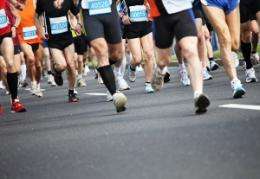(Medical Xpress)—On the morning January 13th, 2013, 25,000 people will meet at the George R Brown convention center for the biggest one day sporting event in Houston. Many of you will be running 26.2 miles for the first time. "As more people attempt this wonderous feat, the risk for injury to someone in the field goes up," says Dr. Scott Rand, with the Methodist Center for Orthopedic Surgery. The volunteer medical staff does a great job of doing everything possible to ensure your safety, but you can go a long way towards helping yourself and making your run as safe, comfortable and enjoyable as possible if you follow a few simple tips.
Lather up! Running for hours causes chafing. Using skin lube anywhere your skin rubs together makes your run and your post run shower much more comfortable. Nipple guards are also a really good idea to avoid really awkward post race picture.
Label yourself. If you have any medical problems or take any medications on a regular basis, wear some sort of identification that lists those medicines and medical problems. If you are in a situation where you can't communicate, that information for rescuers can be life saving.
Hydrate safely. Hopefully you have paid attention to your hydration during your training so you know about how much you need to hydrate to maintain your volumes and not overhydrate. Your body will hang on to your fluids other than sweat pretty well, so if you drink too much fluid, you can cause a condition called hyponatremia, which can be very dangerous. Aim to lose a couple of pounds of fluid during your run. Drink to thirst, and maybe a little more, but don't force yourself to drink at every water station unless your body is really telling you to.
Start with the people you expect to finish with. The race is crowded, so if you start with your friend that runs a lot slower than your pace, you will spend a lot of time dodging runners that you are passing. Likewise, if you start with the 3 hour people and you are a 5 hour marathoner, your chance of getting tripped or run in to by a faster crowd goes up.
Don't be a fool if you have a fever. This is unfortunately an early flu season. You have trained for months for this event, but if you get a flu bug with respiratory symptoms and a fever, running a marathon or half marathon with a fever greatly increases your risk of heat injury. Heat stroke and the muscle damage that comes with it can be deadly and are much more likely if you have a temperature over 101 at the start of the race. If you are sick on race day and your muscles hurt and your fever is over 101, stay home, watch it on tv, and remember how you felt on race day next year when your doctor offers you a flu shot.
Remember, your first marathon is a completion grade. Enjoy it and have fun. You can worry about times after your body has learned that it can go that far. Have a great race.
Provided by The Methodist Hospital System




















